
As a podcaster for justice, I stand with my sisters from the Women of Color Podcasters Community. We are podcasters united to condemn the tragic murders of George Floyd and Breonna Taylor and many others at the hands of police. This is a continuation of the systemic racism pervasive in our country since its inception and we are committed to standing against racism in all its forms.
If you like what you hear or read, visit my Fertile Ground Communications page on Patreon and find out how you can support my work.
All photos in this blog post are covered by copyright and may not be copied or used in any way without written permission from Charles Bergman.
I’ve turned away several white guys who wanted to share their grit and resilience stories on my podcast. As a writer and English major, I’ve always been aware of the vast overrepresentation of white males in publishing, media, and in most professions.
For example, 80 percent of the most popular novels are written by men. The New York Times researched diversity in publishing in late 2020 and discovered an enormous disparity in the number of books written by people of color. The Geena Davis Institute on Gender & Media reports that media has a ratio of approximately 3:1 male characters to female characters. You get the idea.
So when I started the Finding Fertile Ground podcast eight months ago, I knew I wanted to highlight voices on the margins, inviting people who do not always get a platform to share their stories. To date, I’ve interviewed more than 50 people, including 38 women, 24 people of color, 12 immigrants, 12 who identify as LBGTQIA+, and only 7 men.
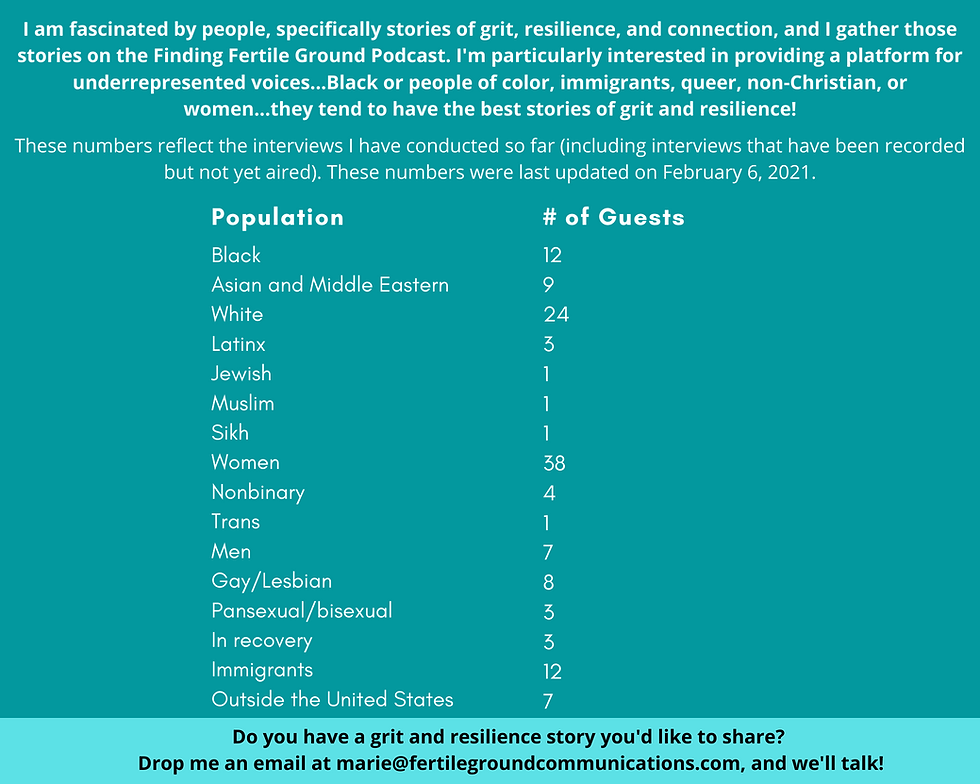
Dr. Chuck Bergman is the first white man I have interviewed, along with his wife Susan Mann. He’s a perfect choice because when I was a 20-year-old junior at Pacific Lutheran University (PLU), he inspired me to become a writer and taught me an important lesson about resilience.

Intending to become a teacher, I had diligently packed my schedules with education classes and practicums. I found myself completely uninspired by the curriculum while loving the invigorating English classes I took for my education specialty. That’s how I found myself in Professor Bergman’s Advanced Composition course during my junior year. Known as a tough professor, he challenged me in new ways to write authentically and dig deep to discover what made me tick as a human.
One day he wrote on one of my papers, “Have you ever thought of majoring in English?”
The thought had never occurred to me and it upset my equilibrium a bit. Not become a teacher? Choose a major without a clearly defined career path? His encouragement changed the trajectory of my life and now I teach in many other ways, although not in a school.
For one of our assignments, he had us write “My Turn” style essays, and I wrote about my sexual assault at age 13. He asked me if I’d be willing to read it to the class. Voice shaking, I shared my story out loud for the first of many times,
And I learned an important lesson: sharing one’s story is critical and therapeutic for resilience.
Now you understand how much Dr. Bergman influenced my life path. Interviewing Chuck and Susan after reading Chuck’s book, Every Penguin in the World: A Quest to See Them All, was a pure honor and privilege.

As a writer, photographer, and retired professor, Chuck has published 5 books and over 150 articles in such prominent magazines as National Geographic, Smithsonian, Audubon, and Natural History. He has won several awards, including the Washington State Book Award. One of his great joys has been to lead student study-away tours to wild destinations like Ecuador, Argentina, Mexico, Chile, Tanzania, and Uganda, and he’s proud to have led six tours to Antarctica with PLU students.
Susan Mann is a professional credentialed coach and leadership consultant who has worked closely with Dr. Brené Brown and The Bill & Melinda Gates Foundation. She’s also a climate reality leader with Al Gore’s Climate Reality Project. She’s a watercolor painter, workshop and SoulCollage® facilitator, and nature lover. She has also researched and written about resilience in the workplace and in life.

Every Penguin in the World: A Quest to See Them All is the story of the couple’s effort to see each of the world's 18 species of penguins in the wild. It is a story of overcoming various challenges and serious health issues.
Penguins are, almost by definition, creatures of hope and resilience, as Chuck explains in “The Penguin Glow: Penguins Teach Us About Hope and Resilience” for Penguins International.
Afflicted with insomnia in recent months, I read Every Penguin in the World during a series of two middle-of-the-night sessions. Unsurprised to discover drop-dead gorgeous photography and beautiful writing, what kept me awake was the suspense-filled storytelling. Chuck explained,
“When I pitched the book to the publisher, I described it as story driven and fact friendly. It was meant to tell stories and to use those as a way to engage people in the whole idea of penguins and why we should care about penguins.”
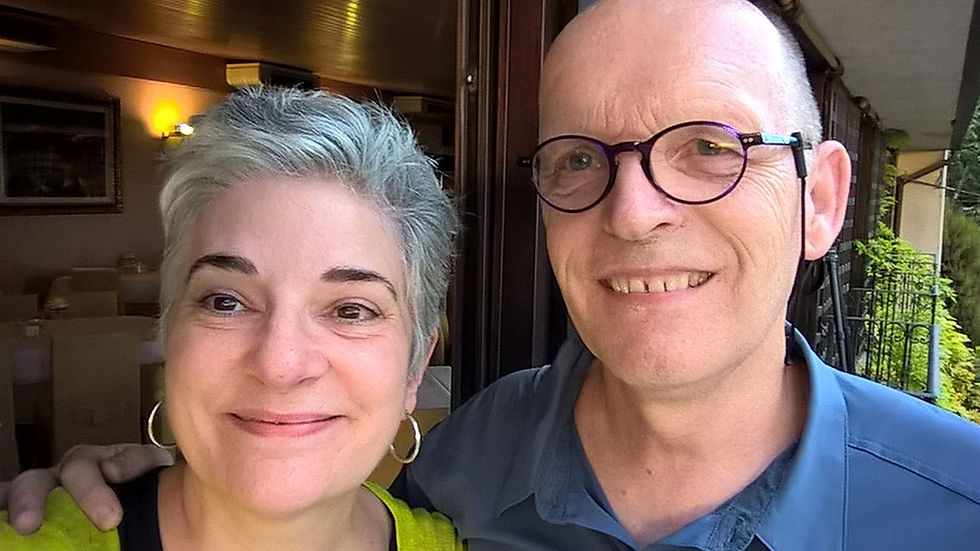
Chuck and Susan are lifelong Pacific Northwesterners, both growing up with an appreciation for animals. For Chuck, he really fell in love with the natural world as a graduate student when he learned to bird watch as a form of relaxation.
Susan had an affinity for penguins before they met, but what actually brought them together was a passion and love for the natural world and wild animals. Their quest and shared passion to see all 18 species of penguins only deepened the bond between them. Chuck was recently interviewed by the Washington Post.
As Chuck took PLU students around the world to remote places like Antarctica, he found himself inspired by life-changing encounters with penguins. I asked Chuck to elaborate on how penguins can provide hope and relieve gloom:
“If you think about penguins, where they live, and what they go through to conduct their lives, it's pretty astonishing. They are models of resilience in very difficult environments, and hope springs from them.”
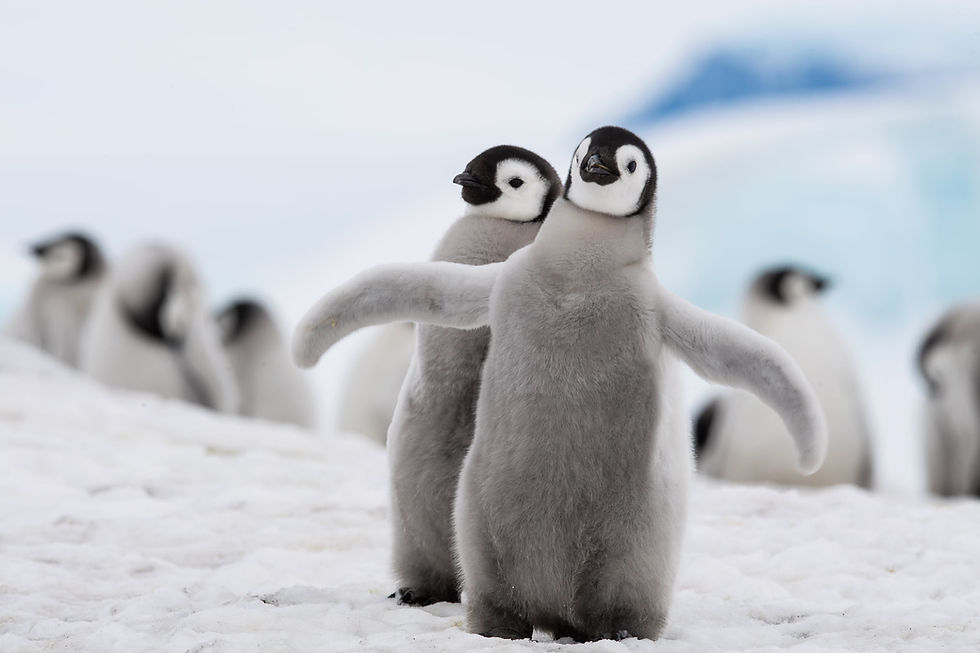
Chuck describes the unique opportunity in Antarctica to develop an intimate connection with animals:
“This is one of the great things about seeing animals in Antarctica… they don't hide from you. They don't flee from you. In fact, you can walk among them and have these kind of intimate experiences with animals…There's something about that that's deeply grounding.”
Penguins take you on a journey of awe and wonder:
“They live in these vast and hostile landscapes…they can manage that landscape in a way that we probably never could, but they don't make you feel insignificant. Seeing penguins and being in Antarctica, you feel small but not insignificant…that sense of awe and wonder is really crucial and life changing, clarifying for values and finding purpose and meaning in life.”

Penguins also offer the therapeutic effects of laughter, as Chuck tells us:
“You can't watch them without laughing. There's just something about being in their company that is really gratifying and restorative…they will definitely make you laugh. They seem so self-important, walking along and then all of a sudden they’ll trip and face plant. Or one of the penguins will slap the other one with its flipper.”
Susan coined a term to describe this restorative feeling in the company of penguins: the penguin glow, as Chuck described in his article for Penguins International.
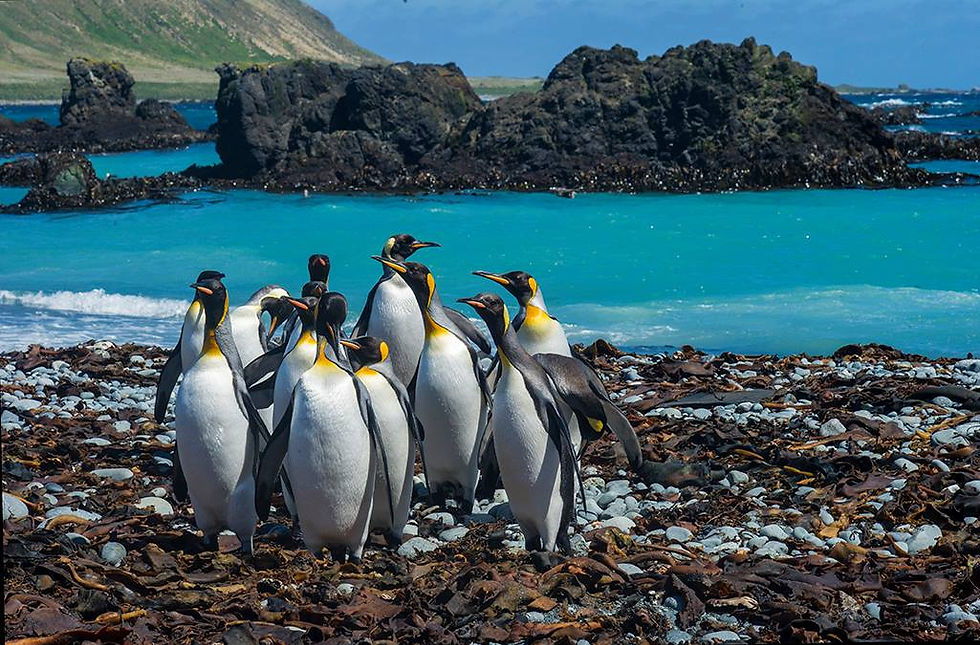
Chuck recounts an intimate encounter with a King Penguin on South Georgia Island, one of the Falkland Islands. He got down on his stomach to take a photo, and one of the penguins came up to him and started pecking at his boots and biting his pants. He looked him in the face and made a loud, hoarse call.
Because King Penguins live on vast beaches and don’t use nests, they carry their egg on their feet and hatch it that way. The chicks wander all over. When the parents come back from fishing, they find their chicks by calling to them. Chuck explains that each penguin has its own call sound, and the children recognize their parents through their calls:
“When the penguin does that call, it's saying, ‘this is who I am’ and asking who are you. Your job is to answer. That was a powerful moment because not only was it a communicative moment with the penguin, but it put me on notice. Who am I, really? And who am I in relationship to all these penguins in the earth that we love?”
That penguin encounter became the driving purpose of the book, to answer the question to that King Penguin.
On Susan and Chuck’s 10th wedding anniversary, they were volunteering on an Earthwatch expedition to study and conserve African Penguins on Robben Island in South Africa. The African Penguins are one of the most endangered penguin species in the world, having lost 95 percent of their population.

Susan was holding a little penguin chick, and she realized it was their 10th species of penguin. Chuck noted it was their 10th anniversary and they had a “10 for 10” record,
“There was something about the symmetry of that moment that just made us say this is meant to be… this is part of who we are together, and that's when we decided right then and there that we were going to go for all 18.”

I asked Susan about her resilience research and an article she wrote with her top 10 resilience practices. She explained she used to have a long commute to Seattle and travel internationally until the pandemic hit.
“So I just reclaimed that time and repurposed it into getting outside and walking. Another thing I make a point of doing regularly is unplugging from social media and email…I make time to get out of my head and just laugh or be creative…people who describe themselves as being the most resilient in enduring ways are people who are engaging all of their senses…doing things that engage heart, mind, body, spirit.”
Susan mentioned an article she read in the Wall Street Journal, “For Better Health During the Pandemic, Is Two Hours Outdoors the New 10,000 Steps?” She pointed out there’s increasing evidence to support what we already intuitively know, that having time outdoors in nature is healing.
I told them about Katrina Nilsson-Gorman, who I interviewed several months ago. After getting raped in India and experiencing serious mental and physical health problems, Katrina found healing in the forest. Now she’s a certified nature and forest therapy guide, soulful mentor, and intuitive healer.
I mentioned my fascination with the fact that Emperor Penguins have a sort of “stay-at-home dad” structure, because the female goes off to fish while the male stays home to incubate the egg (and fast) for months at a time.

“It's just really remarkable how easily we find ourselves able to identify with them and learn from them. They make us think about how we live…The Emperor Penguins definitely provide us with a sense of family drama and family values in the way they raise their chicks.”
Susan recounted one of the grueling stories in the book, which involved a life-or-death river crossing in New Zealand after they saw the Fjordland Penguins. Another memorable story involves their journey to see the Emperor Penguins in Antarctica. Chuck had injured his back and was in excruciating pain, and he almost missed his once-in-a-lifetime opportunity. Listen to the podcast or read the book to hear them share these stories.
I asked them about the threats to penguin habitat and health. Chuck provided incredible resources in the back of the book, and they both created a guide to identify easy ways anyone can make a difference in helping penguins, marine life, and oceans through your daily actions. The actions range from eating less meat and cutting down your plastic use to voting, advocating, and using your voice.
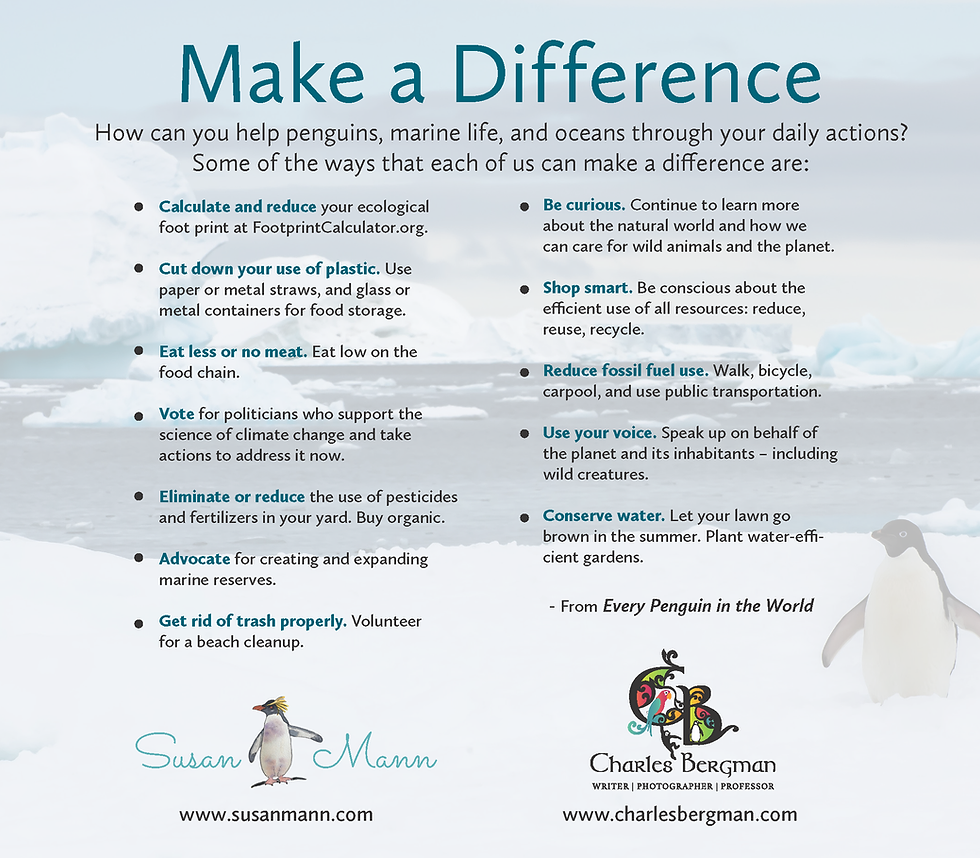
“The big threat for climate change for penguins is warming oceans…the cold water current is shifting 200 miles to the south…the penguins have to swim farther to get food for their babies, and it makes it harder for them to catch fish and to get it back to their babies…which means their babies are now malnourished so it's harder for young penguins to grow to adulthood.”
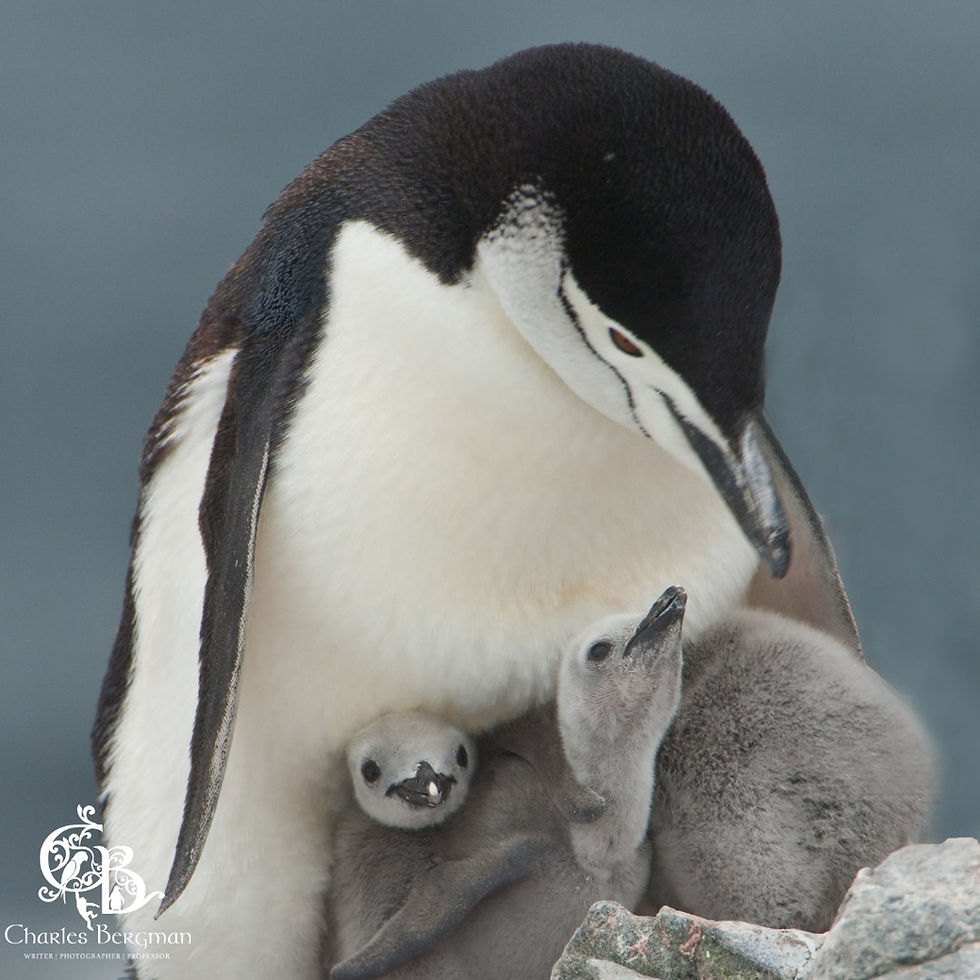
Chuck explained that the Galapagos Penguins only have 800 penguins left, African Penguins are down 95 percent, and the Fjordland Penguin have maybe 2,500 penguins left. Over half of penguin species are already threatened with extinction, thanks to global warming.
Both Susan and Chuck have faced real health challenges in their lives. Susan survived Stage 3 breast cancer, and Chuck revealed in the book that he was diagnosed with Parkinson’s Disease about halfway through their quest.
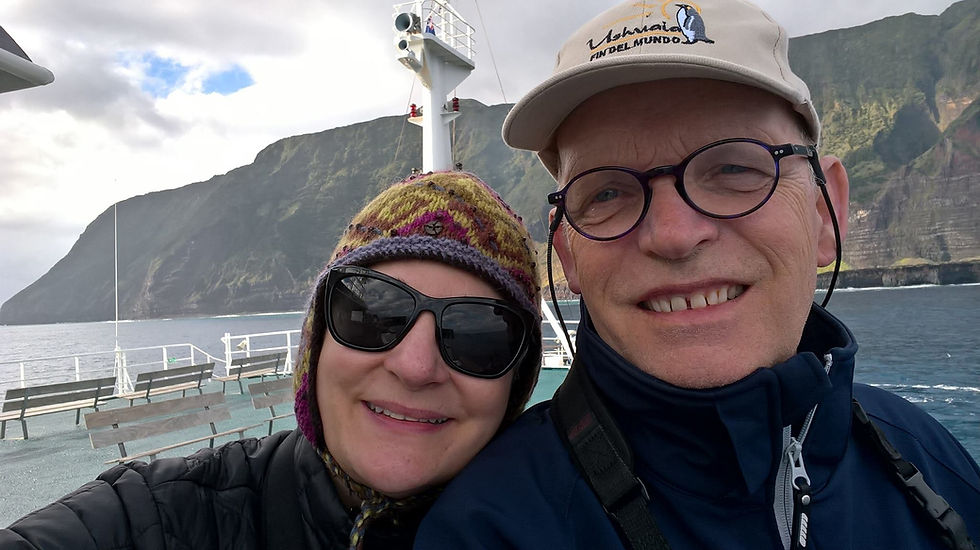
The first time Susan saw a penguin in the wild, she was still receiving cancer treatment in 2004. She made a trip to the Galapagos Island with Chuck and some PLU students.
“I had a marvelous experience snorkeling where I was able to get really close to a Galapagos Penguin sitting on a rock. I will never forget that moment. I’ll carry it with me for the rest of my life…in some ways, that was the start of the penguin quest.”
They both discussed how the natural world is endangered, so it feels important to pursue what matters, to make a difference, and do it while we can.
When Chuck got diagnosed with Parkinson’s, he describes it as a sobering moment.
“One of the things I realized is that all of us are really only one doctor's visit away from our mortality… penguins live in such daunting circumstances and can be such delightful creatures…it just became a model for me. It's easy to be happy when things are going your way. The real question is: can you find happiness when you face challenges? The strange thing is, I felt happier after that diagnosis than I had it at any other point in my life, and it was really remarkable.”
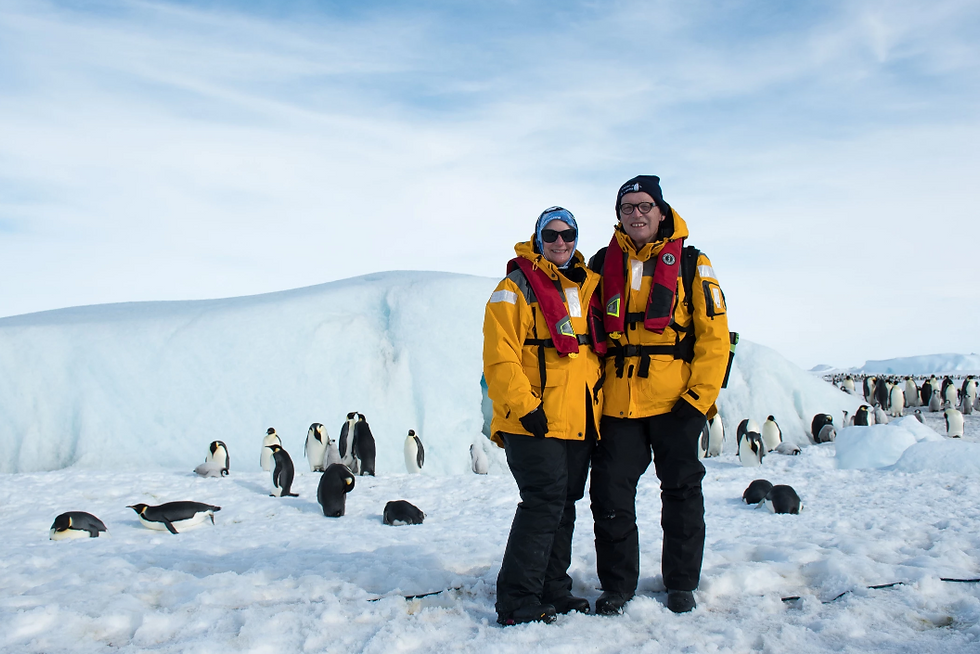
Chuck views their penguin quest as a spiritual journey. They are pilgrims of penguins.
“We were being called in some way, and I began thinking of it as a pilgrimage, kind of an external voyage…it's a journey of the spirit of the soul in some way…for me this became a deepening interest in seeing more deeply into the mystery of things."
In the book, Chuck describes this as seeing with the eyes of the heart as well as with the eyes in his head.
“Emperor Penguins, probably more than any other, took me deeper into my own sense of what life is about.”

Listen to the podcast to hear their memories of low and high points during their quest and how their penguin quest has deepened their relationship and sense of wonder in the world.
While they’re not able to travel again quite yet, they’ve found inspiration in watching movies like “The Octopus Teacher” and reading H is for Hawk by Helen MacDonald, who trains a goshawk in the aftermath of her father's death.
And of course, they’re planning their next wild journeys. They hope to reschedule a trip to Madagascar and Kenya as well as a few more penguin visits, including a return to the Emperor Penguins.
“We've seen all 18 of them, but we still have penguin goals.”
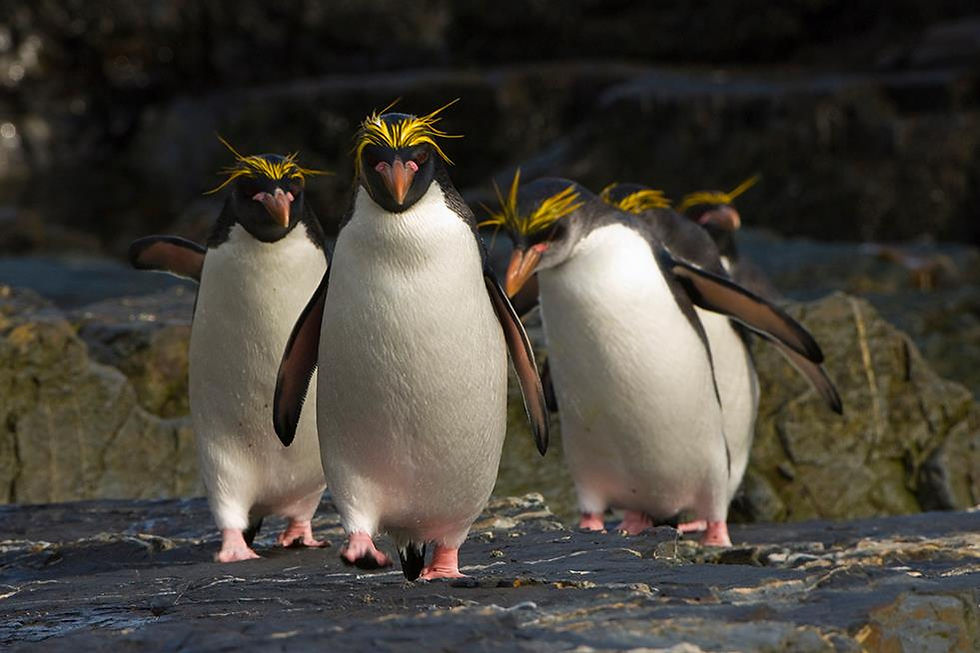
Next week, I interview Murielle Fellous, who bounced back after a depression while raising three teenagers as a single mom and living with Hepatitis B. Originally born and raised in France, she founded the "Single Moms Doing It All" coaching practice and podcast.
The Finding Fertile Ground podcast is brought to you by Fertile Ground Communications. If you enjoyed this podcast, please give us a rating and subscribe to hear our next episode.
Contact us if you can use some help with your writing, editing, communications, or marketing. With 30 years of experience in the environmental consulting industry, I am passionate about sustainability and corporate citizenship, equity & inclusion, businesses that use their power for good, and doing everything I can to create a kinder, more sustainable, and just world. We help organizations and people discover what makes them special and help them share that with the world.
Fertile Ground Communications LLC is a certified women-owned business enterprise, disadvantaged business enterprise, and emerging small business.

Comments